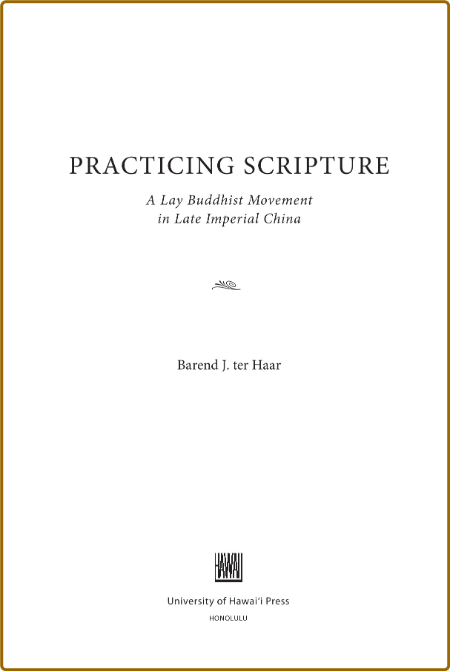
Practicing Scripture - A Lay Buddhist Movement in Late Imperial China
pdf | 5.28 MB | English | Isbn: B013VRJHNO | Author: Barend ter Haar | Year: 2015
Description:
Practicing Scripture is an original and detailed history of one of the most successful religious movements of late imperial China, the Non-Action Teachings, or Wuweijiao, from its beginnings in the late sixteenth century in the prefectures of southern Zhejiang to the middle of the twentieth century, when communist repression dealt it a crippling blow. Uncovering important data on its beliefs and practices, Barend ter Haar paints a wholly new picture of the group, which, despite its Daoist-sounding name, was a deeply devout lay Buddhist movement whose adherents rejected the worship of statues and ancestors while venerating the writings of Patriarch Luo (fl. early sixteenth century), a soldier-turned-lay-Buddhist. The texts, written in vernacular Chinese and known as the Five Books in Six Volumes, mix personal experiences, religious views, and a wealth of quotations from the Buddhist canon.
Ter Haar convincingly demonstrates that the Non-Action Teachings was not messianic or millenarian in orientation and had nothing to do with other new religious groups and networks traditionally labelled as White Lotus Teachings. It combined Chan and Pure Land practices with a strong self-identity and vegetarianism and actively insisted on the right of free practice. Members of the movement created a foundation myth in which Ming (1368-1644) emperor Zhengde bestowed the right upon their mythical forefather. In addition, they produced an imperial proclamation whereby Emperor Kangxi of the Qing (1645-1911) granted the group similar privileges.
Thanks to its expert handling of a great number and variety of extant sources, Practicing Scripture depicts one of the few lay movements in traditional China that can be understood in some depth, both in terms of its religious content and history and its social environment. The work will be welcomed by China specialists in religious and Buddhist studies and social history.
Ter Haar convincingly demonstrates that the Non-Action Teachings was not messianic or millenarian in orientation and had nothing to do with other new religious groups and networks traditionally labelled as White Lotus Teachings. It combined Chan and Pure Land practices with a strong self-identity and vegetarianism and actively insisted on the right of free practice. Members of the movement created a foundation myth in which Ming (1368-1644) emperor Zhengde bestowed the right upon their mythical forefather. In addition, they produced an imperial proclamation whereby Emperor Kangxi of the Qing (1645-1911) granted the group similar privileges.
Thanks to its expert handling of a great number and variety of extant sources, Practicing Scripture depicts one of the few lay movements in traditional China that can be understood in some depth, both in terms of its religious content and history and its social environment. The work will be welcomed by China specialists in religious and Buddhist studies and social history.
Category:Buddhist History, Buddhist History, History of China
Download from RapidGator
Download from DDownload
Download from NitroFlare










